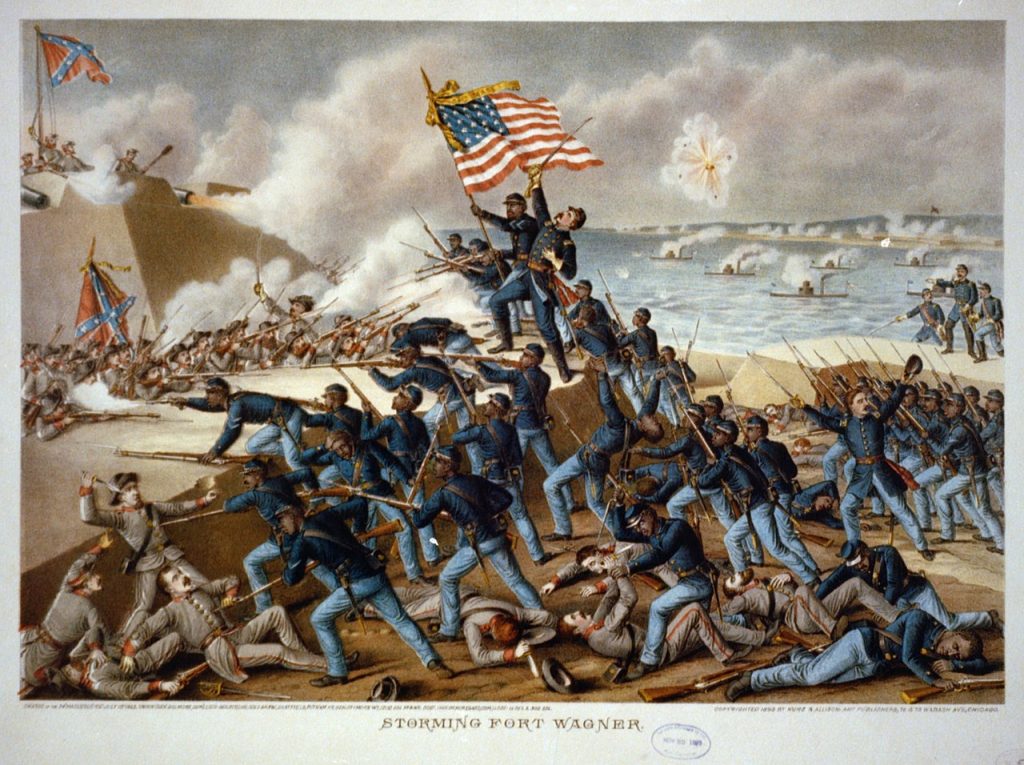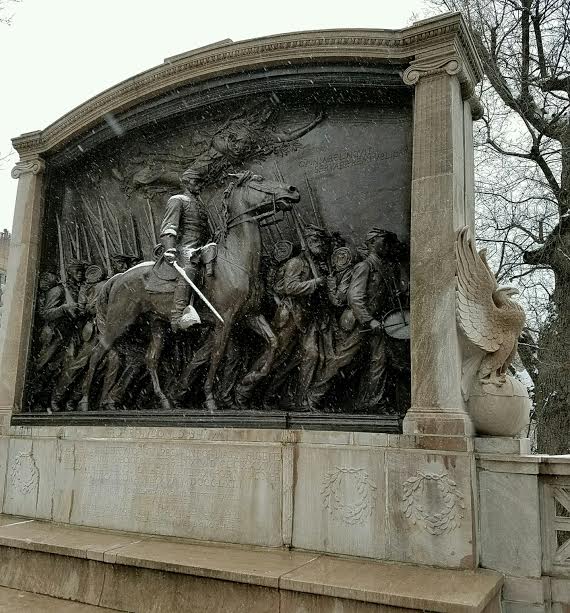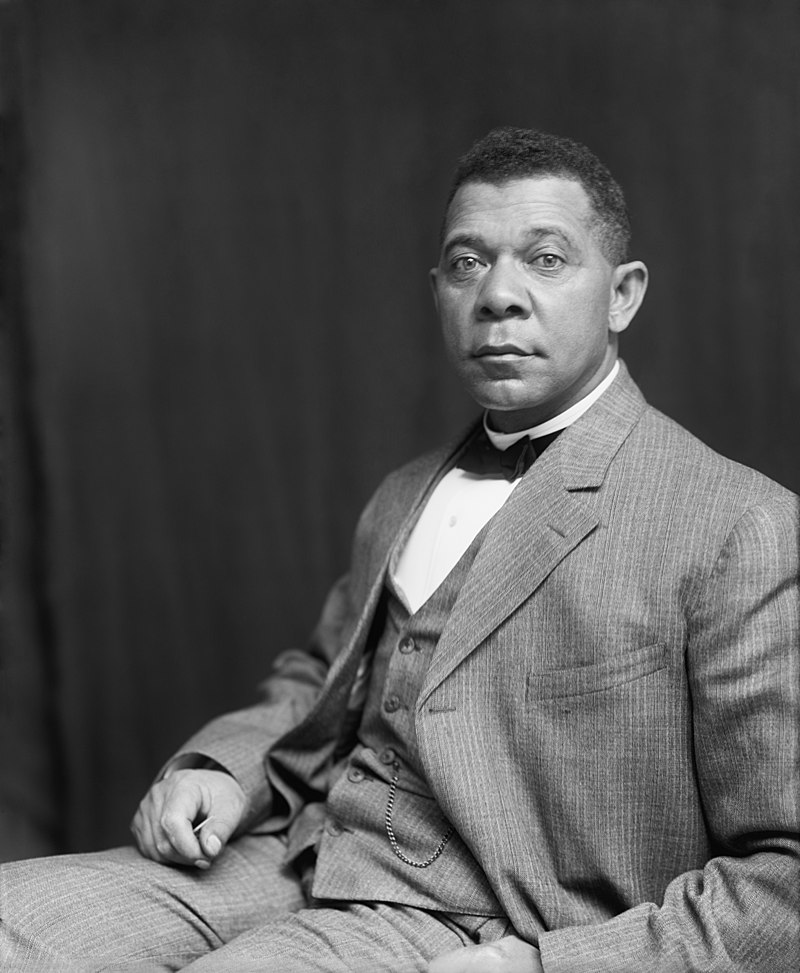“What these heroic souls of the 54th Regiment began, we must complete”: Booker T. Washington’s Address

Today — July 18, 2023 — marks the 160th anniversary of the 54th Massachusetts fatal attack on Battery Wagner. The fortification sat at the northern end of Morris Island, near Charleston, South Carolina. Previous attempts to breach the sand and earthen walls had been unsuccessful. On July 18, 1863, after an impressive naval bombardment, a sunset infantry attack charged toward the fort.
Colonel Robert Gould Shaw and the 54th Massachusetts Regiment led the charge. The 54th had departed from Boston and into active Union service at the end of May 1863, one of the first African American regiments to be recruited and sent to the campaign shores. Confederates waiting inside the sand fort waited until the leading Union soldiers came within 150 yards, then fired. The Union regiments reached the fort and fought until around 10:30 that night, before retreating.
The Confederates held the battery that night. Later, when they buried the dead, they buried Colonel Shaw (a white officer) with the fallen Black soldiers, intending the integrated grave trench to be an insult. Instead, Shaw’s family and other abolitionists interpreted his resting place as an honor and a symbol for white and black soldiers fighting together for freedom.
On May 30, 1897, a monument to Colonel Robert Gould Shaw and the 54th Massachusetts Regiment was dedicated in Boston, Massachusetts. A little more than 30 years after the Civil War ended, the speeches at the dedication offer a glimpse into the meaning that the participants gave to the attack at Battery Wagner, Shaw’s death and burial, and Black soldiers’ sacrifices and triumphs. Prominent leaders from the abolitionist movement, military men, and academics spoke. Booker T. Washington gave the concluding address.

Born enslaved in 1856, Booker T. Washington became a prominent leader in the African American community during the last decade of the 19th Century and into the early 20th Century. He was an educator, author, and speaker and served as a presidential advisor. He helped to found several colleges, including Tuskegee Institute. Washington faced an era of discrimination and the rise of Jim Crow laws and disenfranchisement throughout the southern states. To counter this civil right oppression, Washington publicly advocated for better education and strong entrepreneurship in the Black community, believing that an upward movement with self-help, education, and pride would be the best path forward to equality. He quietly supported court cases that challenged segregation and used actively his political advisory roles to gain support, fundraise, and keep the media informed. Not all Black leaders and activists agreed with Washington’s approach or advocacy points, and some later accused him of trying to accommodate racism or white supremacy through his reconciling stances.
Booker T. Washington was seven years old and living in bondage in Virginia on July 18, 1863. Not until 1865 did his family learn about the Emancipation Proclamation. Washington struggled and succeeded in the post-Civil War world, blazing a trail of education and ideas during a difficult period of history. When he rose to speak about the unfinished legacy of the soldiers of the 54th Massachusetts Regiment and their white officers, Washington invited his listeners to ponder what had been accomplished and what still lay ahead. He spoke about his vision for a forward path through education and entrepreneurship. He saw an unfinished journey of civil rights, hoping for a day when racism would recede and equality would be real in society.

Here is Booker T. Washington’s complete address from the dedication of the 54th Massachusetts Monument:
Mr. Chairman, and Fellow-Citizens: In this presence, and on this sacred and memorable day, in the deeds and death of our hero, we recall the old, old story, ever old, yet ever new, that when it was the will of the Father to lift humanity out of wretchedness and bondage, the precious task was delegated to him who among ten thousand was altogether lovely, and was willing to make himself of no reputation that he might save and lift up others.
If that heart could throb and if those lips could speak, what would be the sentiment and words that Robert Gould Shaw would have us feel and speak at this hour? He would not have us dwell long on the mistakes, the injustice, the criticisms of the days
“Of storm and cloud, of doubt and fears Across the eternal sky must lower Before the glorious noon appears.”
He would have us bind up with his own undying fame and memory, and retain by the side of his monument, the name of John A. Andrew, who, with prophetic vision and strong arm helped make the existence of the 54th Regiment possible; and that of George L. Stearns, who, with hidden generosity and a great sweet heart, helped to turn the darkest hour into day, and in doing so freely gave service, fortune, and life itself to the cause which this day commemorates. Nor would he have us forget those brother officers, living and dead, who, by their baptism in blood and fire, in defense of union and freedom, gave us an example of the highest and purest patriotism.
To you who fought so valiantly in the ranks, the scarred and scattered remnant of the 54th Regiment, who with empty sleeve and wanting leg have honored this occasion with your presence, — to you your commander is not dead. Though Boston erected no monument, and history recorded no story, in you and the loyal race which you represent, Robert Gould Shaw would have a monument which time could not wear away.
But an occasion like this is too great, too sacred, for mere individual eulogy. The individual is the instrument, national virtue the end. That which was three hundred years being woven into the warp and woof of our democratic institutions could not be effaced by a single battle, as magnificent as was that battle; that which for three centuries had bound master and slave, yea, North and South, to a body of death, could not be blotted out by four years of war, could not be atoned for by shot and sword, nor by blood and tears.
Not many days ago, in the heart of the South, in a large gathering of the people of my race, there were heard from many lips praises and thanksgiving to God for his goodness in setting them free from physical slavery. In the midst of that assembly a Southern white man arose, with gray hair and trembling hands, the former owner of many slaves, and from his quivering lips there came the words: “My friends, you forget in your rejoicing that in setting you free God was also good to me and my race in setting us free.” But there is a higher and deeper sense in which both races must be free than that represented by the bill of sale. The black man who cannot let love and sympathy go out to the white man is but half free. The white man who would close the shop or factory against a black man seeking an opportunity to earn an honest living is but half free. The white man who retards his own development by opposing a black man is but half free. The full measure of the fruit of Fort Wagner and all that this monument stands for will not be realized until every man covered by a black skin shall, by patience and natural effort, grow to that height in industry, property, intelligence, and moral responsibility, where no man in all our land will be tempted to degrade himself by withholding from his black brother any opportunity which he himself would possess.
Until that time comes, this monument will stand for effort, not victory complete. What these heroic souls of the 54th Regiment began, we must complete. It must be completed not in malice, nor narrowness, nor artificial progress, nor in efforts at mere temporary political gain, nor in abuse of another section or race. Standing as I do to-day in the home of Garrison and Phillips and Sumner, my heart goes out to those who wore the gray as well as to those clothed in blue, to those who returned defeated to destitute homes, to face blasted hopes and shattered political and industrial system. To them there can be no prouder reward for defeat than by a supreme effort to place the negro on that footing where he will add material, intellectual, and civil strength to every department of state.
This work must be completed in public school, industrial school, and college. The most of it must be completed in the effort of the negro himself; in his effort to withstand temptation, to economize, to exercise thrift, to disregard the superficial for the real, the shadow for the substance, to be great and yet small; in his effort to be patient in the laying of a firm foundation, to so grow in skill and knowledge that he shall place his services in demand by reason of his intrinsic and superior worth. This, this is the key that unlocks every door of opportunity, and all others fail. In this battle of peace, the rich and poor, the black and white may have a part.
What lesson has this occasion for the future? What of hope, what of encouragement, what of caution? “Watchman, tell us of the night, what the signs of promise are.” If through me, an humble representative, nearly ten millions of my people might be permitted to send a message to Massachusetts, to the survivors of the 54th Regiment, to the committee whose untiring energy has made this memorial possible, to the family who gave their only boy that we might have life more abundantly, that message would be: Tell them that the sacrifice was not in vain, that up from the depths of ignorance and poverty we are coming, and if we come through oppression, out of the struggle we are gaining strength; by way of the school, the well-cultivated field, the skilled hand, the Christian home, we are coming up; that we propose to invite all who will to step up and occupy this position with us. Tell them that we are learning that standing ground for a race, as for an individual, must be laid in intelligence, industry, thrift, and property, not as an end, but as a means to the highest privileges; that we are learning that neither the conqueror’s bullet, nor fiat of law, could make an ignorant voter an intelligent voter, could make a dependent man an independent man, could give one citizen respect for another, a bank account, a foot of land, or an enlightened fireside. Tell them that, as grateful as we are to artist and patriotism for placing the figures of Shaw and his comrades in physical form of beauty and magnificence, that after all the real monument, the greater monument, is being slowly but safely builded among the lowly in the South, in the address by struggles and sacrifices of a race to justify all that has been done and suffered for it.
One of the wishes that lay nearest to Colonel Shaw’s heart was, that his black troops might be permitted to fight by the side of white soldiers. Have we not lived to see that wish realized, and will it not be more so in the future? Not at Wagner, not with rifle and bayonet, but on the field of peace, in the battle of industry, in the struggle for good government, in the lifting up of the lowest to the fullest opportunities. In this we shall fight by the side of white men North and South. And if this be true, as under God’s guidance it will, that old flag, that emblem of progress and security which brave Sergeant Carney never permitted to fall upon the ground, will still be borne aloft by Southern soldier and Northern soldier, and in a more potent and higher sense we shall all realize that
“The slave’s chain and the master’s Alike are broken. The one curse of the races
Held both in tether: They are rising, — all are rising, The black and white together!”
Source:
Bruce Rogers, The Monument to Robert Gould Shaw (Boston: Houghton, Mifflin and Co., 1897). Accessed through Archive.org
Washington came the closest to Lincoln in understanding the true spiritual meaning of the war. Thank you for this, Sarah.
Here here!
BT Washington – “But an occasion like this is too great, too sacred, for mere individual eulogy. The individual is the instrument, national virtue the end.”
A Lincoln – “…we can not dedicate—we can not consecrate—we can not hallow—this ground. The brave men, living and dead, who struggled here, have consecrated it, far above our poor power to add or detract.”
I may be stretching but I hear parts almost as Shakespearean…
“To you who fought so valiantly in the ranks, the scarred and scattered remnant of the 54th Regiment, who with empty sleeve and wanting leg have honored this occasion with your presence…” – BT Washington
I agree with the guy, education is the solution. Thank you for this.